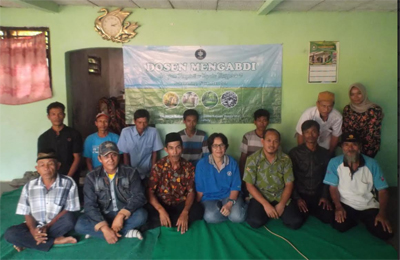IPB Universitys Service Lecturer Teaches Sheeps Health and Reproduction in Harkat Jaya Village, Bogor

Research and Community Service Body (LPPM) of IPB University presents Service Lecturer in Harkat Jaya Village, Sukajaya, Bogor (14/12). The theme brought in this socialization is about Sheeps Health and Reproduction. This socialization is attended by breeders from various small villages in Harkat Jaya Village.
In this event, the two lecturers present were Dr Drh Yudi from Reproduction, Obstetrics, and Gynaecology Division and DR Drh Retno Wulandari from Internal Medicine Division, Faculty of Veterinary Medicine.
Drh Yudi explained in every small villages in Harkat Jaya Village, that almost all the residents are sheep breeders. That was the reason for this socialization about sheep to be held in this village.According to him, sheep is a type of cattle that most likely to be bred in villages. This is caused by sheeps high adaptability, cheap care, quick breed, and wide need for several occasion like aqiqah, qurban, etc.
Reproduction in sheep is influenced by genetics, feed, health, and stall. The ideal time for sheep reproduction is three birth in two years, with birth intervals around eight months is considered normal, because sheeps mother still takes care of her lamb around three months. Besides pointing the birth interval, another important factor is the origin. Sheep is considered good if the physical appearance is normal and not sick, not skinny, not too fat, and energetic.He added.
After that Drh Wulan also explained about sheeps health management. She explained that sheeps health management is very important. The breeders need to understand the differences between healthy and unhealthy sheeps characteristics. If the sheeps health management is not well done, then it will result in loss towards the breeders themselves.
Drh Wulan added about factors affecting sheeps health like climate change, temperature, and air humidity. Extreme environment changes, crowded stalls, bad ventilations, too high light intensity can affect and make animal sick.
In this opportunity, Atang, one of the sheep breeder from Parigi, Harkat Jaya village, expressed about problems in his sheeps condition where they dont weight enough, although has been fed enough and regularly.
Responding to that, Drh Wulan said that the sheeps weight can be influenced by the type of feed they are fed, environment, and the sheeps health. If the sheep bred is underweight, then try to diversify the feed to that which has higher protein content such as rice bran.She said.
Drh Yudi also added that grass feeding should use wilted grass. Freshly cut grass has higher gas content, if eaten could affect the digestive system. Besides that, harvesting time also affects the quality of the grass, so the breeders are recommended to have grass that has been exposed to sunlight, to avoid from worm eggs and bacteria.
Meanwhile, Cecep as the head of farmers association in food sector who expressed his gratitude with the presence of lecturers from IPB University for sharing the knowledge around sheep.
To be honest, we still have little knowledge on that matter, especially if a decrease of sheeps condition happened. Hopefully in the future, events like this are improved and continued, specifically in form of sustainable guidance for the breeders in Harkat Jaya Village.He said. (IAAS/KRH)
Keywords : Sheep breeders, service lecturer, LPPM IPB University, IPB lecturer



